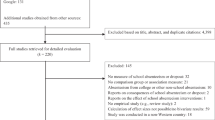Abstract
Objectives
School refusal is seen as an emergency in child psychiatry and various risk factors have been analyzed. Children who present with school refusal have been shown to have several associated psychiatric comorbidities. However, risk assessment of psychiatric comorbidities is lacking, particularly in the Indian context. The authors aimed to study the sociodemographic profile and associated psychopathology in children with school refusal. They compared the prevalence rates of psychiatric illnesses to that of the community. A best-fit model for risk assessment of psychopathology was formulated.
Methods
Past records of children aged 5–16 y, who presented with school refusal in the period from June 2013 through June 2015 to authors’ Child Guidance Clinic were studied and their sociodemographic details, symptoms and diagnoses were obtained. Chi square test of proportion was used to compare the prevalence rates between the study population and community. Multinomial analysis was used to elucidate a best-fit model of risk assessment.
Results
School refusal was seen in 3.6% of children. 77.8% of the children had a psychiatric diagnosis, most common being depression (26.7%), followed by anxiety (17.7%). Prevalence of psychiatric disorders was significantly higher in the study population than community (p < 0.05). A best-fit model of 4 factors: academic difficulties, adjustment problems at school, behavioral problems and parental conflicts is suggested (p < 0.05).
Conclusions
School refusal is associated with significant psychopathology, most commonly depression, followed by anxiety. The best-fit model for risk assessment can predict the likelihood of psychopathology and help in early diagnosis.

Similar content being viewed by others
References
Fremont WP. School refusal in children and adolescents. Am Fam Physician. 2003;68:1555–60.
Kearney CA, Silverman WK. The evolution and reconciliation of taxonomic strategies for school refusal behaviour. Clin Psychol Sci Pract. 1996;3:339–54.
Hersov L. School refusal. Br Med J. 1972;3:102–4.
Bernstein GA, Hektner JM, Borchardt CM, McMillan MH. Treatment of school refusal: one-year follow-up. J Am Acad Child Adolesc Psychiatry. 2001;40:206–13.
Flakierska-Praquin N, Lindstrom M, Gillberg C. School phobia with separation anxiety disorder: a comparative 20- to 29-year followup study of 35 school refusers. Compr Psychiatry. 1997;38:17–22.
Berg I, Jackson A. Teenage school refusers grow up: a follow-up study of 168 subjects, ten years on average after in-patient treatment. Br J Psychiatry. 1985;147:366–70.
Tyrer P, Tyrer S. School refusal, truancy, and adult neurotic illness. Psychol Med. 1974;4:416–21.
Heyne D, King NJ, Tonge BJ, Cooper H. School refusal: epidemiology and management. Paediatr Drugs. 2001;3:719–32.
Bernstein GA, Massie ED, Thuras PD, Perwien AR, Borchardt CM, Crosby RD. Somatic symptoms in anxious-depressed school refusers. J Am Acad Child Adolesc Psychiatry. 1997;36:661–8.
Hersov L. School refusal. In: Rutter M, Hersov L, editors. Child psychiatry: modern approaches. Oxford: Blackwell; 1997. p. 382–99.
McShane G, Walter G, Rey JM. Characteristics of adolescents with school refusal. Aust N Z J Psychiatry. 2001;35:822–6.
Bernstein GA, Borchardt CM. School refusal: family constellation and family functioning. J Anxiety Disord. 1996;10:1–19.
Kearney CA, Silverman WK. Family environment of youngsters with school refusal behavior: a synopsis with implications for assessment and treatment. Am J Fam Ther. 1995;23:59–72.
Bernstein GA, Warren SL, Massie ED, Thuras PD. Family dimensions in anxious-depressed school refusers. J Anxiety Disord. 1999;13:513–28.
Last CG, Strauss CC. School refusal in anxiety-disordered children and adolescents. J Am Acad Child Adolesc Psychiatry. 1990;29:31–5.
Bernstein GA. Comorbidity and severity of anxiety and depressive disorders in a clinic sample. J Am Acad Child Adolesc Psychiatry. 1991;30:43–50.
King NJ, Bernstein GA. School refusal in children and adolescents: a review of the past 10 years. J Am Acad Child Adolesc Psychiatry. 2001;40:197–206.
Gururaj G, Varghese M, Benegal V, Rao GN, Pathak K, Singh LK, et al. National mental health survey of India, 2015-16. Bengaluru: National institute of mental health and neuro sciences, NIMHANS Publication No 128, 2016.
Ollendick TH, Mayer JA. School phobia. In: Turner SM, editor. Behavioral theories and treatment of anxiety. New York: Plenum Press; 1984. p. 367–406.
Prabhuswamy M, Srinath S, Girimaji S, Seshadri S. Outcome of children with school refusal. Indian J Pediatr. 2007;74:375–9.
Okuyama M, Okada M, Kuribayashi M, Kaneko S. Factors responsible for the prolongation of school refusal. Psychiatry Clin Neurosci. 1999;53:461–9.
Egger HL, Costello JE, Angold A. School refusal and psychiatric disorders: a community study. J Am Acad Child Adolesc Psychiatry. 2003;42:797–807.
Kahn JH, Nursten JP. School refusal: a comprehensive view of school phobia and other failures of school attendance. Am J Orthop. 1962;32:707–18.
Hoshino Y, Nikkuni S, Kaneko M, Endo M, Yashima Y, Kumashiro H. The application of DSM-III diagnostic criteria to school refusal. Psychiatry Clin Neurosci. 1987;41:1–7.
Bahali K, Tahiroglu AY, Avci A, Seydaogl G. Parental psychological symptoms and familial risk factors of children and adolescents who exhibit school refusal. East Asian Arch Psychiatry. 2011;21:164–9.
Schwab JA. Multinomial logistic regression: basic relationships and complete problems. 2002. Available at: http://www.utexas.edu/courses/schwab/sw388r7/SolvingProblems/ Accessed on 9th Mar 2017.
Kasen S, Johnson J, Cohen P. The impact of school emotional climate on student psychopathology. J Abnorm Child Psychol. 1990;18:165–77.
Hinshaw SP. Externalizing behavior problems and academic underachievement in childhood and adolescence: causal relationships and underlying mechanisms. Psychol Bull. 1992;111:127.
Contributions
All the three authors formulated the protocol, prepared the results and discussion, and approved the final draft. BS and HN did the sampling and analysis. AN will act as guarantor for this paper.
Author information
Authors and Affiliations
Corresponding author
Ethics declarations
Conflict of Interest
None.
Rights and permissions
About this article
Cite this article
Nayak, A., Sangoi, B. & Nachane, H. School Refusal Behavior in Indian Children: Analysis of Clinical Profile, Psychopathology and Development of a Best-Fit Risk Assessment Model. Indian J Pediatr 85, 1073–1078 (2018). https://doi.org/10.1007/s12098-018-2631-2
Received:
Accepted:
Published:
Issue Date:
DOI: https://doi.org/10.1007/s12098-018-2631-2




